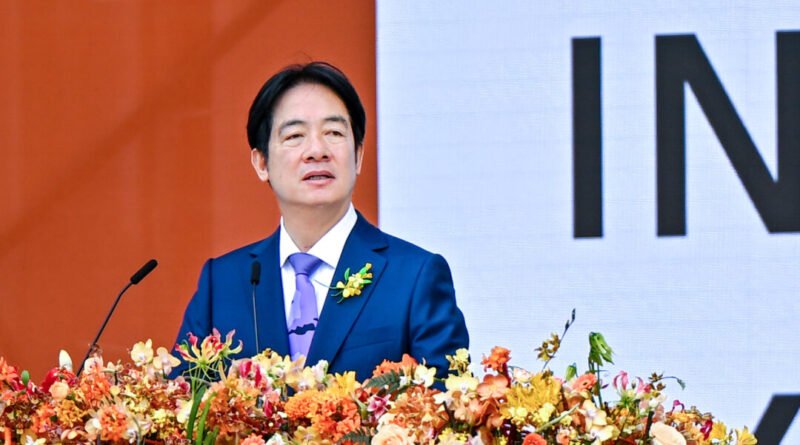During UN Meeting, Taiwan President Alerts about China’s Global Hegemonic Ambitions
The Taiwanese leader expressed in a videotaped address that the Chinese regime has been distorting Resolution 2758 to support its ‘one China principle.’
“China’s threat to Taiwan extends to the entire international community. China not only aims to disrupt the status quo in the Taiwan Strait but also seeks to alter the rules-based international order and establish international dominance,” Lai explained.
Taiwan withdrew from the United Nations in 1971 following the passing of Resolution 2758 by the U.N. General Assembly, which transferred Taiwan’s U.N. seat to China. Since then, due to Beijing’s opposition, the self-governed island has been excluded from formal involvement in U.N. meetings and activities.
Lai accused the Chinese regime of distorting Resolution 2758 to support its “one China principle,” falsely asserting that the document gives Beijing the authority to claim sovereignty over Taiwan and that Taiwan lacks the right to engage in the U.N. system and other international forums.
The president expressed gratitude to the United States and the Inter-Parliamentary Alliance on China (IPAC) for their efforts to counter Beijing’s interpretations of the resolution.
“Taiwan’s exclusion from the WHO and WHA undermines the WHO’s mission to build a healthier future for the global community,” the letter states.
The senators also highlighted Beijing’s attempt to utilize the resolution “as a pretext to impede Taiwan’s engagement with the international community.”
Lai emphasized that the Chinese Communist Party (CCP) has been elevating its aggression in the Indo-Pacific region, creating instability in the rules-based international order.
“We have observed China intensifying its military threats in the Taiwan Strait and the East and South China Seas. Through gray-zone tactics like economic coercion and cognitive warfare, China poses serious threats to global peace and stability,” Lai remarked.
“Our sincere hope is for Taiwan and other democratic nations to jointly support the democratic umbrella and counter authoritarian aggression as we navigate a new era in global democratic development,” Lai expressed.

Alexander Tah-ray Yui (L), Taiwan’s top representative to the United States, and Keith Krach, former U.S. Under Secretary of State, speak at the Concordia Summit in New York City on Sept. 24, 2024. Edwin Huang/The Epoch Times
China
Following Lai’s video address, Alexander Tah-ray Yui, Taiwan’s top representative to the United States, and Keith Krach, former U.S. Under Secretary of State and chairman and co-founder of the Krach Institute for Tech Diplomacy at Purdue University, both noted at the summit that the CCP and its leader, Xi Jinping, view Taiwan’s democracy as a “major threat.”
“Taiwan serves as a beacon for freedom and democracy, not just regionally but globally. … It debunks [Xi’s] belief that Chinese culture cannot prosper within a democracy, hence he aims to eradicate it,” Krach remarked.
Yui stated that the CCP perceives Taiwan’s freedom and democracy as a challenge to its legitimacy.
Yui also highlighted that China’s expenditure on domestic security surpasses its military budget, signifying that the CCP views its populace as its primary adversary.
Yui emphasized the importance of democratic nations taking the lead as countries advance technologically.
“Trust in technology is crucial,” Yui emphasized. “It is essential for us, the democratically aligned nations, to ensure that the technology we possess and develop stays ahead of or far ahead of the other side.
“We use it to enhance and improve human well-being; the other side uses it to control its population.”
Yui underscored Taiwan’s crucial role in advancing global technology, citing the country’s leadership in semiconductor production. According to Yui, Taiwan accounts for approximately 60 percent of the world’s semiconductors and 92 percent of advanced semiconductors.
“Discussing the future, which is technology, without involving Taiwan is akin to visiting downtown New York in Little Italy and getting a cannoli without its filling,” Yui expressed. “If you talk about the future without Taiwan, you will fall behind.”
Following the session, reporters inquired about Taiwan’s concerns regarding the U.S. presidential election outcome in November. In response, Yui stated that Taiwan enjoys robust bipartisan support in Congress.
Yui remarked that regardless of who wins the U.S. presidency, the level of U.S. support for Taiwan will remain unaltered in the face of ongoing threats posed by the Chinese regime to the United States.
Edwin Huang contributed to this report.





